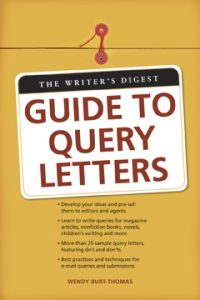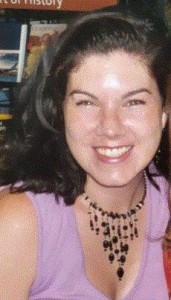 My guest today is freelance writer and editor Wendy Burt-Thomas. I didn’t know Wendy until she contacted me about her blog tour for her book The Writers Digest Guide To Query Letters
My guest today is freelance writer and editor Wendy Burt-Thomas. I didn’t know Wendy until she contacted me about her blog tour for her book The Writers Digest Guide To Query Letters
(reviewed in my last post). I’ve learned she is a very talented and entertaining writer, and I know you’ll enjoy her visit here.
Lillie: Welcome to A Writer’s Words, An Editor’s Eye, Wendy. What led you to write a book on query letters?
Wendy: I’d been teaching “Breaking Into Freelance Writing” for about eight years. In the workshop, I covered a lot of what is in this book: writing query letters to get articles in magazines, to land an agent, or to get a book deal with a publisher. Since I’m a full-time freelance magazine writer and editor with two previous books, this was incredibly fun to write because it didn’t require tons of research. I was lucky enough to receive lots of great sample query letters from writers and authors that I use as “good” examples in the book. I wrote all the “bad” examples myself because I didn’t dare ask for contributions that I knew I’d be ripping apart!
Lillie: Can you tell us a little more about the book?
Wendy: In addition to the ins and outs of what makes a good query, the book covers things like why (or why not) to get an agent, where to find one and how to choose one; writing a synopsis or proposal; selling different rights to your work; other forms of correspondence; and what editors and agents look for in new writers.
Lillie: I enjoyed the book because of your entertaining writing style and humor. I didn’t expect that. How did that come about?
Wendy: It was really important to me that the book not be a dry, boring reference book, but rather an entertaining read (while still being chock full of information). I was thrilled that Writer’s Digest let me keep all the humor.
Lillie: What is the most important thing you want readers to take away from The Writer’s Digest Guide to Query Letters?
Wendy: I want them to understand that while writing a good query letter is important, it doesn’t have to be overwhelming. You can break it down into parts, learn from any first-round rejections, and read other good queries to help understand what works. I also want them to remember that writing is fun. Sometimes new writers get so caught up in the procedures that they lose their original voice in a query. Don’t bury your style under formalities and to-the-letter formatting.
Lillie: Your book is broken down into several kinds of query letters. Tell us a little about when and to whom a writer needs to send a query letter.
Wendy: The short answer is regarding when to send queries is, whenever the guidelines say to. Smaller publications may not have writers’ guidelines, or may allow you to just send the completed manuscript. As a general rule, the larger the circulation, the more likely they’ll want a query letter. There are exceptions for special sections. For example, Family Circle might not require queries for things like reader tips, short personal essays, funny kids’ stories, etc. If the guidelines don’t specify to whom you should send your query, send it to someone farther down the food chain, like an assistant editor. The top editor on the masthead probably never looks at query letters because they’re too busy managing the entire publication.
With books, you’ll also be following the agency’s or publishing house’s guidelines. Some will say “send query” or “query with synopsis,” while others will say “send first 30 pages” or “send proposal.” Choose the agent or acquisitions editor that represents your genre. Don’t assume that your query will be forwarded to the correct person.
Lillie: Why are query letters so important?:
Wendy: Breaking into the publishing world is hard enough right now. Unless you have a serious “in” of some kind, you really need a great query letter to impress an agent or acquisitions editor. Essentially, your query letter is your first impression. If they like your idea (and voice and writing style and background), they’ll either request a proposal, sample chapters, or the entire manuscript. If they don’t like your query letter, you’ve got to pitch it to another agency/publisher. Unlike a manuscript, which can be edited or reworked if an editor thinks it has promise, you only get one shot with your query. Make it count!
I see a lot of authors who spend months (or years) finishing their book, only to rush through the process of crafting a good, solid query letter. What a waste! If agents/editors turn you down based on a bad query letter, you’ve blown your chance of getting them to read your manuscript. It could be the next bestseller, but they’ll never see it. My advice is to put as much effort into your query as you did your book. If it’s not fabulous, don’t send it until it is.
Lillie: There’s an entire chapter in the book about agents. Do you think all new writers should get agents?
Wendy: Probably 99% of new writers should get an agent. There are lots of reasons, but my top three are: 1) Many of the larger publishing houses won’t even look at unagented submissions now; 2) Agents can negotiate better rights and more money on your behalf; 3) Agents know the industry trends, changes, and staff better than you ever could.
Lillie: What advice do you have for aspiring writers?
Wendy: Seize every opportunity – especially when you first start writing. I remember telling someone about a really high-paying writing gig I got and he said, “Wow. You have the best luck!” I thought, “Luck has nothing to do with it! I’ve worked hard to get where I am.” Later that week I read this great quote: “Luck is when preparation meets opportunity.” It’s absolutely true. And writing queries is only about luck in this sense. If you’re prepared with a good query and/or manuscript, when the opportunity comes along you’ll be successful.
I’ve been a mentor, coach, or editor for many writers, and I know the most common reason that good writers don’t get published is poor marketing skills. I see so many writers that are either too afraid, too uniformed, or frankly, too lazy, to market their work. They think their job is done when the write “the end” but writing is only half of the process. I’ve always told people who took my class that there are tons of great writers in the world who will never get published. I’d rather be a good writer who eats lobster than a great writer who eats hot dogs. I make a living as a writer because I spend as much time marketing as I do writing.
Lillie: What was the best thing about writing this book?
Wendy: Writing the “bad” query letters. I’ve read – and written! – so many horrible ones over the years that it was a little too easy to craft them. But misery loves company and we ALL love to read really bad query letters, right?
Lillie: I’m sure my readers will want to know more about you and your book. Do you have a blog and/or Web site?
Wendy: To learn more about me or my three books, visit www.GuideToQueryLetters.com. If you have a writing-related question, you can also post it on http://AskWendy.wordpress.com.
Lillie: Is there anything else you’d like to share that I haven’t asked?
Wendy: I think it’s encouraging for writers to know that this is actually a great time to be a freelancer. Many companies can’t afford to keep full-time writers/editors/PR creatives on staff, so they’re turning to independent contractors. In the eyes of an employer, they don’t have to pay health, dental or 401K, so even a higher hourly rate is worth it. If you’ve ever thought about becoming a full-time freelancer, this is a good climate to try it!
Lillie: Wendy, thank you for visiting. I’m sure I didn’t ask everything my readers want to know so I hope you’ll check in during the day to answer questions.
Wendy: Absolutely! I appreciate you having me here today. It’s my pleasure!
Wendy Burt-Thomas is a full-time freelance writer, editor, and copywriter with more than 1,000 published pieces. Her third book, The Writer’s Digest Guide to Query Letters, hit stores in January 2009. To learn more about Wendy or her three books, visit http://www.GuideToQueryLetters.com. If you have a writing-related question, you can also post it on http://AskWendy.wordpress.com.

